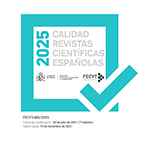Reshaping Space in a Global World: Portuguese and Brazilian Networks
Abstract
In a contemporary context, the concept of power networks is used in the study of political society. The overlapping of political power and the varied networks of entities that shape the social context create a consensus on political communities’ analysis. This paper aims to develop the study of some historical examples of the phenomenon of transatlantic transmissions of norms, beliefs and values that revise the sense of a Luso-Brazilian community. New approaches, namely on the perspectives that documentary films offer on political and cultural paths are made possible by a revised historiography and new cultural political approaches. In the late twentieth century, the image and the documentary film formed an important communication mechanism enhancing the cultural and symbolic imagery shared between Portugal and Brazil. However, the new political configurations under the globalization process confiscate and transform that imagery. Reshaped power transferred from institutions to individuals allows other readings of cultural and political language communities.
Downloads
Article download
License
In order to support the global exchange of knowledge, the journal Geopolítica (s) Revista de estudios sobre espacio y poder is allowing unrestricted access to its content as from its publication in this electronic edition, and as such it is an open-access journal. The originals published in this journal are the property of the Complutense University of Madrid and any reproduction thereof in full or in part must cite the source. All content is distributed under a Creative Commons Attribution 4.0 use and distribution licence (CC BY 4.0). This circumstance must be expressly stated in these terms where necessary. You can view the summary and the complete legal text of the licence.









